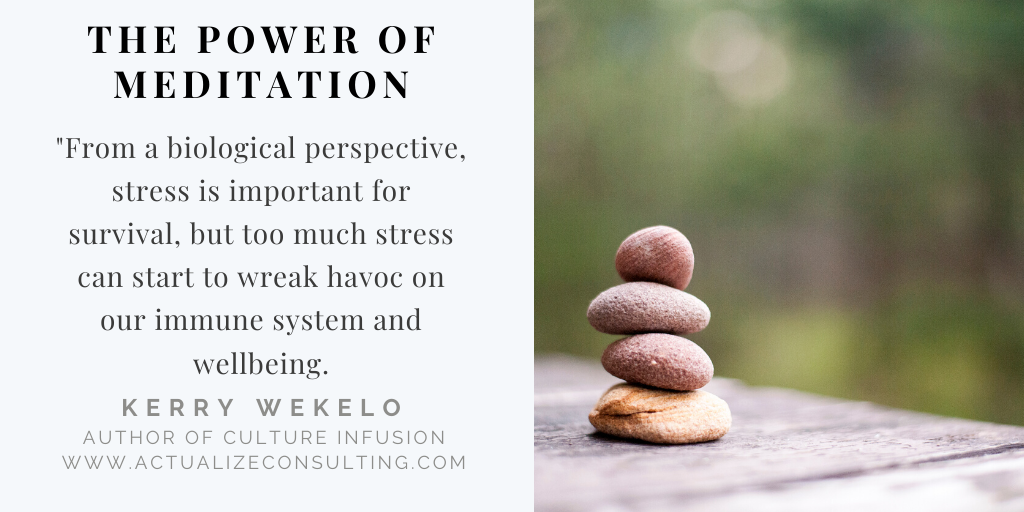As you know, stress is an unavoidable part of life. From a biological perspective, stress is important for survival, but too much stress can start to wreak havoc on our immune system and well-being. It’s important to have ways to counterbalance this state so we can be our happiest and healthiest selves. My go to is meditation – it’s a great, scientifically supported stress reliever.
There are actually many different types of meditation of which most people are unaware. In Robert Butera’s book, Meditation for your Life, he details six different types: breath, visualization, mantra, devotion, mindfulness, and contemplative inquiry. The beautiful aspect of meditation is that you can do it anywhere or anytime and for any amount of time. The more consistent you are, the bigger the impact.
Nicole Braveman, a Chopra Center Certified Instructor who discovered meditation after her struggle with her own chronic illness shared some of these impacts with our team at Actualize. Meditation:
- Improves our ability to cope and improve emotional stability when dealing with stress
- Slows down the aging process
- Decreases activity of the genes responsible for inflammation and chronic illness
Dr. Rudy Tanzi’s research has also found something fascinating: “Disease-associated gene mutations that will actually destine a person to acquire a disease with certainty in the span of a normal life span amount to only 5% of all disease-associated mutations." Meaning that the other 95% of our chances depend majorly on lifestyle and diet. These findings and more are published in his and Deepak Chopra's book Super Genes.
Like Nicole, I turn to meditation during times of stress, illness, or when I need to solve a challenge and find a solution. Both of us and even a lot of great historical figures can attest to its power. Einstein said, “I think 99 times and find nothing. I stop thinking, swim in silence, and the truth comes to me.”
After Nicole led a meditation for our team, I polled them to see how they felt afterward. Maddie Yaskowski, a senior consultant at Actualize, said, “I was surprised how much I relaxed during the meditation. I had never done one that long before, even though this was actually a short meditation. At first, I definitely had a lot of thoughts and had trouble bringing my attention back to my breath. But as I started to become even calmer, it became easier to quiet my thoughts. I noticed I was actually quite tired - it may be good to try this before I go to bed because I usually have trouble falling asleep.”
In that same meditation class with Nicole, we explored a mantra-based meditation using the Sanskrit word sohum. This type of meditation is one I especially enjoy - focusing on one word rather than striving for complete silence.
Lori Lite, a manager with us and founder of Stress Free Kids said, “unexpectedly, I found myself responding to the word gentle. I have never contemplated or noticed how just hearing this word would affect my nervous system. Whenever Nicole said the word gentle or gently, I felt myself relaxing further. Breathe gently, be a gentle observer…. I am inspired to try using the word gentle during my next one-word mantra meditation.”
While teaching yoga to children for seven years in the school system, I could not use Sanskrit, so I would use words the kids could identify with. For example, Buzz Aldrin Eagles (the name of the school mascot) became one of our mantras. If you are interested in some of the meditations I used in my classes, you can listen here.
If you are interested in starting to meditate, know that there are many paths you can take to begin. There are guided meditations, sound meditations, mantra meditations, walking meditations, and breathing meditations. Play with the different techniques and see which style suits you best… your mind and body will thank you!


 RSS Feed
RSS Feed